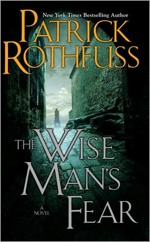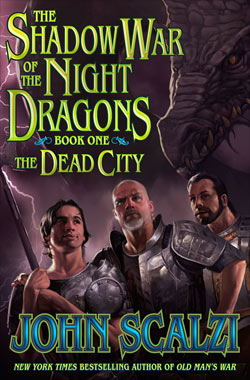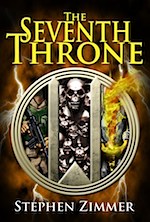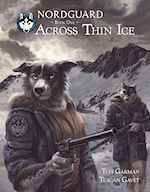We’ve counted your votes—all 3000 of them—winnowed out the duplicates over many a night of pizza and wine, and arrived at the winners of the 2011 Tor.com Readers’ Choice Awards!
The poll gave us a couple of interesting turns during and after the voting and it would be safe to say it took on a life of its own. (Note to selves: Never build a robot.) You’ll find more commentary from us in that regard after the results.
But first, let’s look below for the top ten most voted on titles in the categories of Novel, Short Fiction, Covers, and Comics.
The top ten most voted on Novels are:
-
 The Wise Man’s Fear by Patrick Rothfuss (140 votes)
The Wise Man’s Fear by Patrick Rothfuss (140 votes) - The All-Pro by Scott Sigler (105 votes)
- The Alloy of Law by Brandon Sanderson (63 votes)
- The Seventh Throne by Stephen Zimmer (63 votes)
- Ready Player One by Ernest Cline (55 votes)
- The Final Arbiter by Mark Rivera (55 votes)
- A Dance With Dragons by George R. R. Martin (53 votes)
- Fuzzy Nation by John Scalzi (52 votes)
- Dancing With Eternity by J.P. Lowrie (50 votes)
- Among Others by Jo Walton (49 votes)
Patrick Rothfuss took the top slot by a substantial margin, although Scott Sigler’s The All-Pro was neck and neck with The Wise Man’s Fear for nearly the entire length of the poll. Voting was consistent for The Wise Man’s Fear throughout the entire 10-day length of voting, whereas fans of The All-Pro came out in bursts throughout the 10 days. In this case, slow and steady ended up winning the race.
The top ten in the Novel category ended up being evenly split between books with active social/author campaigns behind them and books that garnered votes without that assistance. This pattern appeared about halfway through the voting and basically solidified there, with the top ten books as of that point mostly remaining the top ten books, barring minute changes in position within that established top ten.
This remains the case with the final results and considering how close the race is between a lot of these titles, the line-up would have undoubtedly continued to jump around in place, although Wise Man’s Fear most likely would have widened the gap between it and the other nine titles.
This isn’t the first time Patrick Rothfuss has found a groundswell of support on Tor.com. His debut novel, The Name of the Wind, placed third in our Best SFF Novels of the Decade Readers’ Poll.
There is a definite correlation between titles that didn’t have author campaigns behind them—The Wise Man’s Fear, The Alloy of Law, Ready Player One, Among Others, and to a smaller extent A Dance With Dragons —and their presence on Tor.com. Our coverage of Patrick Rothfuss, Brandon Sanderson, and George R. R. Martin is extensive, and Jo Walton, the author of Among Others, has written over 500 posts on the site!
This leaves Ready Player One by Ernest Cline as a fascinating outlier. We couldn’t find any visible or insistent request from Cline or the book’s publisher regarding voting for it, and our coverage of it is practically microscopic in comparison to the above-mentioned titles. It should also be noted that Embassytown by China Mieville was one vote shy of the top ten, and would fit this classification, as well.
The top ten most voted on pieces of Short Fiction were:
-

“The Shadow War of the Night Dragons, Book One: The Dead City“ by John Scalzi (appearing on Tor.com) – 108 votes
- “The Windfarmer’s Guest” by Lucas Ahlsen (appearing in Abyss & Apex) – 69 votes
- “All Mimsy” by Kelly Wright (appearing on FlashFictionOnline.com) – 50 votes
- “An Island Sojourn” by Stephen Zimmer (appearing in Dreams of Steam) – 23 votes
- “Awakening of Evarun, Part 1″ by Tom Barczak – 16 votes
- “Absinthe Fish” by M. David Blake (appearing in Bull Spec) – 9 votes
- “Houses” by Mark Pantoja (appearing in Lightspeed) – 8 votes
- “Infinity Blade: Awakening” by Brandon Sanderson – 6 votes
- “The Dala Horse“ by Michael Swanwick (appearing on Tor.com) – 5 votes
Once John Scalzi threatened to rescue kittens if you voted for his short story, nobody else in this category stood a chance. (And if you visit the link above, you’ll see he actually followed through on that. Great job rescuing kittens, internet!)
(Also, just a quick housekeeping note: The list of short stories that garnered 4 votes each is fairly long, so we capped this list at 9.)
For those unfamiliar with Scalzi’s story, its origin can be traced back to our Best SFF Novels of the Decade Readers’ Poll and the subsequent data it generated in regards to most used words in fantasy titles. We joked that “Shadow War of the etc etc etc.” would be a powerhouse of a fantasy tale and lo, John Scalzi made our dreams come true a few weeks later. The short story topping the Short Fiction top ten offers a sweet postscript to that.
In all seriousness, the results in this category were perhaps the most revealing of all in regards to the format it covered. The number of professional SFF short fiction outlets has expanded massively in the last ten years and story submissions have kept pace right along with that.
Yet, votes on short fiction were a mile wide and an inch thick. Only 9 pieces of short fiction got more than 4 votes. In comparison, 50 novels were voted on more than 4 times. Additionally, the top 6 pieces of short fiction benefitted from author campaigns, whereas the top 50 novels lean more towards merit-based votes.
Granted, this isn’t a lot of data with which to draw any conclusion, but it did become an additional piece of data for something we’ll talking about a bit further down.
The top ten most voted on Covers were:
-
 The Seventh Throne by Stephen Zimmer, cover by Matthew Perry (55 votes)
The Seventh Throne by Stephen Zimmer, cover by Matthew Perry (55 votes) - Dragon Fate by J.D. Hallowell, cover credits not listed (27 votes)
- Deathless by Catherynne M. Valente, cover by Beth White, design by Peter Lutjen (20 votes) – See how the cover to Deathless was created.
- The All-Pro by Scott Sigler, cover design by Donna Mugavero (20 votes)
- Leviathan Wakes by James S. A. Corey, cover by Daniel Dociu (19 votes)
- The Alloy of Law by Brandon Sanderson, cover by Chris McGrath (18 votes)
- Towers of Midnight ebook edition by Robert Jordan and Brandon Sanderson, cover by Raymond Swanland (12 votes)
- Reamde by Neal Stephenson, cover design not listed (11 votes)
- Across Thin Ice by Tess Garman & Teagan Gavet, cover by same (11 votes)
- God’s Eye by A.J. Scudiere, cover by Ruke, design by Greenleaf Book Group LLC and Alex Head (8 votes)
Matthew Perry wins the Cover vote for the cover to Stephen Zimmer’s The Seventh Throne. This cover took the lead very early on in the poll and never let up.
The votes in the Cover category were telling, as nearly every vote for a cover was including along with a vote for that book as Best Novel (or in the case of Across Thin Ice, best Comic). It was rare to find a voter who considered a cover without including the merits of the author and it highlights an interesting conundrum in regards to book covers. The teams behind book covers are very often separate from the authors themselves, and yet that separation doesn’t exist in the minds of most readers. At this point, is it possible for them to exist separately if you’re not accustomed to detecting a designer and artist’s technique?
The top ten most voted on Comics were:
-
opens in a new window
 Across Thin Ice – 71 votes
Across Thin Ice – 71 votes - Girl Genius – 20 votes
- XKCD – 20 votes
- The Order of the Stick – 12 votes
- Schlock Mercenary – 8 votes
- The Unwritten – 7 votes
- Questionable Content – 5 votes
- Animal Man (The New 52) – 4 votes
- Locke & Key: Clockworks – 4 votes
- TURF – 3 votes
An author campaign shot Across Thin Ice by Tess Garman & Teagan Gavet to the top slot in the Comics category, which it held for the remainder of the poll. Along with Covers, Comics was a mostly exploratory category in that it was included in the poll mostly because we were curious as to what kind of information would result from the casting of votes. Comics ended up being a bit all over the map, however, with only the top 3 choices garnering any significant votes.
 How We Counted Votes:
How We Counted Votes:
Shenanigans were called quite early on in the Readers’ Choice Awards poll due to sudden and active campaigning on the part of several authors. Although this activity annoyed many of our usual readers, the waves of votes for single authors fell well within the behavior we were expecting to find. (In fact, considering it was an open readers’ poll, we were expecting far more than what actually resulted.) Our approach was to count every vote regardless of source during the daily updates, then check for sockpuppeting, duplicates, and so on during the recount.
The check did eliminate a lot of votes, the majority of them being for books that were being promoted through author campaigns. What was suprising in this regard was that a good number of the duplicate votes were not direct ballot-stuffing actions but rather due to blind loyalty, enthusiasm, or simple mistakes on the part of the voter.
Our search for duplicates began with email address, IP addresses, and other related information. If something suspicious came up, we’d dig deeper and piece together the user’s entire activity on the site or do further research into the location a certain batch of votes was coming from. Sometimes votes came up clean (there’s a particular architectural firm out there that really loves a certain title!) and sometimes they came up completely dirty (many anagrams of a couple usernames does not a clever disguise make).
For the most part, though, duplicate votes tended to be people being pretty innocently enthusiastic, voting once a day like clockwork or hitting the submit button too many times in a row. We expected to find duplicate votes, but we didn’t expect the majority of them to be simple human error, done without malice. That was an interesting revelation to come across and it’s quite nice to see that a poll that was essentially running on the honor system conducted itself with honor.
What We Learned:
The Best SFF Novels of the Decade Readers’ Poll we ran last year was a hell of a lot of work, but also a hell of a lot of fun, so we were curious to see if that would translate to a much shorter timespan. Additionally, 2011 was a huge and varied year for releases in science fiction and fantasy, and we were curious as to what stood out the most in what is already an overwhelmingly colorful pack.
We got that to an extent, but another narrative took over the Readers’ Choice Awards, one we did not expect to come out in such force: The mechanics of online promotion.
The number of votes we received and the size of the audience we were reaching lent itself perfectly to spotlighting the effects that personal promotional efforts have on the success and awareness of a book. Authors are often pressed to create an online presence, whether it’s through a publicity department at a major publisher or through friends and family that want to see your book hit big.
With few exceptions, authors taking advantage of their existing online presence were by far the most active competition in this poll. We kept tabs of this activity early on and watched with fascination at the various approaches being taken. Scott Sigler kept his fans excited about maintaining his lead by presenting it with the same themes that appeal to fans of his books: this is a competition and you are rooting for a team. Stephen Zimmer presented himself as the underdog to his friends and family and kept that narrative going throughout the poll. John Scalzi got jocular with it and saved a kitten, reminding his fans of the same humorous qualities that they liked about his short story.
These authors didn’t just ask their fans to support them, they made the act of support something interesting in and of itself. There was reward, escalation, narrative, and an endpoint. And those narratives echoed the same qualities that the fans responded to in the author and/or their work.
As the poll continued, watching this technique unfold seemingly by itself was fascinating. We were watching a concept that seems completely ephemeral—”create an online presence”—as a mechanical process, proceeding bit by bit. To put it crudely, there was the sausage being made, right in front of us.
Was it we were expecting? Nah. But it was interesting. More interesting than a horse race has any call to be.
Thanks for voting, everyone. Congratulations to all of the winners!










